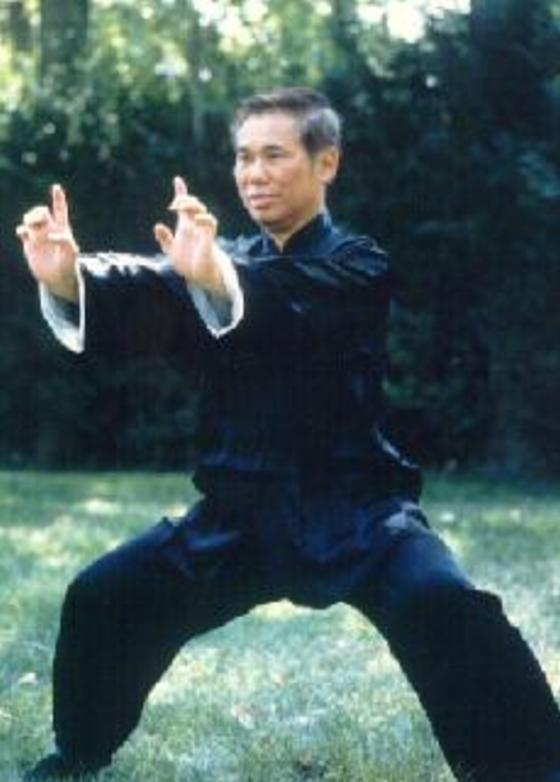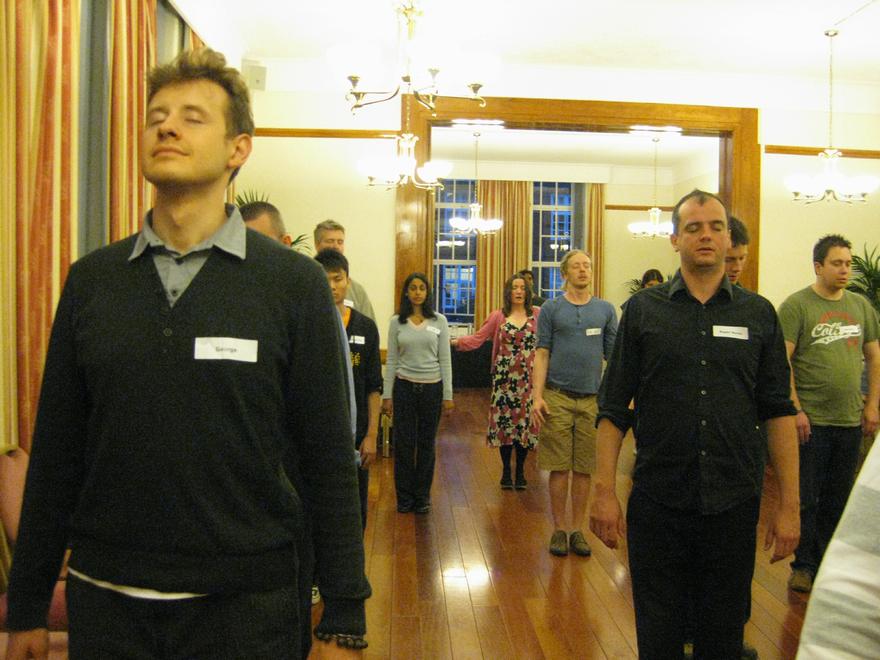OPENING THE HEART, INTERNAL FORCE
AND LEARNING VERSUS EXPERIENCING

Sifu Roland and Grandmaster Wong opening their heart
Question
Often mental clarity and internal force are highlighted in Zen courses which give us indeed beautiful gifts. I also seem to read about opening the heart. My Sifu explained to me that the internal force aspect is connected with opening the heart (if I understood it right).
Is there anything we can do to assist our internal force in opening our hearts? What is an open heart in Zen?
How can we reassure that we have a good balance between learning/knowing and practicing/experiencing Zen?
Binia
Answer
Zen courses come in different types with different benefits. In some Zen courses, instructors conduct sitting meditation. This gives the students an experience of Zen. In other Zen courses, instructors talk about Zen. This gives the student an understanding of Zen.
The "doing" courses contribute to the student' mental clarity. The "talking" courses contribute to the students' understanding of what Zen is, though their mind may or may not be clearer after these "talking" courses. But in both the "doing" and the "talking" courses, instructors almost never help students to develop or talk about internal force. It is only in Zen courses as well as other lessons in our school that internal force, besides mental clarity, is practiced and talked about.
In the above discussion we assume that the "doing" and "talking" Zen courses are genuine. If they are not genuine, in the "doing" courses instructors teach students to sit in a lotus or semi-lotus position, but the students do not practice sitting meditation. They merely sit in a sitting meditation position and subject their mind to countless thoughts. As a result of their training, they become more stressful instead of being relaxed, which is a very basic benefit of genuine Zen training.
In the "talking" courses instructors often talk about Zen history and Zen stories but without explaining what Zen is. As a result students become more confused about Zen instead of having a clear idea of how to practice Zen and what the benefits are. Indeed, this contributed an important reason why I wrote my book, "The Complete Book of Zen", which was initially entitled “Understanding and Practicing Zen”.
Unfortunately, genuine Zen courses are rare today. The truth of this statement can be readily verified if you observe people who have attended Zen courses, including Zen retreats. A great majority of them are stressful and do not understand what Zen is.
We are proud to say that our school, Shaolin Wahnam, is one of the very few that teach genuine Zen. How can we justify our claim that we teach genuine Zen? A good way is to examine the result. Not only our students are relaxed, mentally fresh and understand what Zen is, some of them even have satori experiences.
Our Zen courses are special. Our Zen students also develop internal force, which is normally not included in Zen courses elsewhere even when these are genuine. Yes, mental clarity and internal force give us a lot of benefit. It enables us to have better result no matter what we do!
Yes, our internal force training is connected with opening the heart. This does not mean that other people who have not opened their heart cannot develop internal force. They still can, but not only the internal force developed is less powerful, it can also be risky.
If his heart is not open, the internal force developed may be locked up in his body. Worse, it may be locked up in his heart, which can be dangerous.
How does opening the heart make internal force training safe, and enable a practitioner develop more internal force? When his heart is open, his energy flows. When energy is flowing it cannot be locked up.
Moreover, flowing energy both increases the amount of energy as extra energy from the Cosmos will be attracted in, as well as speed up the process of internal force building because internal force is a function of the smoothness and volume of energy flow.
Yes, to assist your internal force there are a number of things you can do while and also after opening your heart.
While opening your heart, you should be upright and relaxed, and not be thinking of anything. In this way you will enhance the amount of internal force being built. Reversely, if your poise is crooked, you are tensed or you think of various thoughts, your internal force will be much minimized, or there may not be any internal force at all.
Nevertheless, even when you open your heart and you are upright and relaxed, and not thinking of anything, the internal force developed may not be much. You can increase the amount of internal force tremendously if you continue to practice an internal force training exercise.

Golden Bridge
We have many internal force training exercises in our school. You can just choose one. Some examples are One-Finger Shooting Zen, Golden Bridge, Lifting Water, Three-Circle Stance, Horse-Riding Stance, Pushing Mountain, Separating Water, Big Wind Mill, Flicking Fingers, Pushing Up, Jerking Elbows, Cosmic Shower, Abdominal Breathing, and Small Universe.
In Zen, an open heart is an open heart. It is not described in flowery language, as in Taoist writing, like opening of the central gate, or blossoming of the heart flower.
Genuine Zen training would result in an open heart. This will intrinsically give rise to Zen practitioners being generous and happy.
However, nowadays if you observe people who profess that they practice Zen, many of them are not happy, and often not generous. This is an indication that much of Zen practice today is not genuine.
On the other hand, you will find that most Shaolin Wahnam members are happy and usually generous. This is because we practice Zen, not just in Zen courses but also in Chi Kung, Shaolin Kungfu and Taijiquan. Indeed, every time we practice Chi Kung, Shaolin Kungfu or Taijiquan, we start by smiling from the heart, which will open the heart.
To reassure that you have a good balance between learning/knowing and practicing/experiencing Zen is very simple. Just do it. This is Zen. If you intellectualize about it, it is not Zen.
But before you have a good balance, and then reassure yourself that you have a good balance, it is helpful to understand the difference between learning/knowing and practicing/experiencing Zen.
Let us take a few examples.
If you understand that the characteristics of Zen is being simple, direct and effective, you learn and know about Zen.
If your actions are simple, direct and effective, you practice and experience Zen.
Learning/knowing and practicing/experiencing are not the same. You may learn and know that the characteristics of Zen are being simple, direct and effective, yet your actions may not be simple, direct and effective. On the other hand, your actions may be simple, direct and effective, but you may not know that these are the characteristics of Zen.
If you understand that to open your heart, you need to be relaxed and think of nothing. This is learning and knowing about opening the heart. It is theoretical knowledge. In practice, you may not be able to open your heart.
If you actually open your heart and feel happy and generous, you practice and experience opening the heart. This is practical benefit. In theory you may not know that to open your heart you need to be relaxed and think of nothing.
If you understand that to develop internal force, you need energy flow. This is learning or knowing about internal force. But in real life, you may not have internal force though you know its theory.
If you are small-sized and do not use muscular strength, you are more powerful than a bigger-sized and muscular opponent, you have internal force, but you may not know about its theory.
In Zen, if one has to choose between learning/knowing and practicing/experiencing, the choice is practical experience over theoretical knowledge. This does not mean that Zen practitioners do not value knowledge, but if a choice has to be made, they prefer experience.
That was why Bodhidharma asked Zen monks to burn their books. It did not mean that Bodhidharma did not value books, but the monks were so preoccupied with studying books that they missed out practical benefits.
Of course, the best is to have a balance between learning/knowing and practicing/experiencing, i.e. between theoretical knowledge and practical benefits.
With this understanding, which is theoretical knowledge, we balance learning/knowing with practicing/experiencing, which is practical benefit. Having made the balance in practice, we reassure that the balance is good. This is Zen. If we just intellectualize about the concept but do nothing practical about it, it is not Zen.
Let us take an example. You want to develop internal force. First you learn what internal force is, how to develop it, and what its benefits are. This is theoretical knowledge.
Next, you search for a master who has internal force and is willing to teach you. You practice according to what he teaches, and periodically access the results to ensure that they correspond to what internal force is said to give. This is practical benefit.
Then, you check that your practicing/experiencing matches your learning/knowing. This is reassuring that you have a good balance.
On the other hand, if a person learns and knows a lot about internal force, but never puts his learning and knowing into practice, he does not have balance. No matter how much he knows, he will still have no internal force.
If another person goes straight to train internal force without first learning and knowing about it, he also has no balance. He may or may not develop internal force, but it is unlikely that he is cost-effective, and likely that he would derive harmful side-effects.
Hence, have a good balance between learning/knowing and practicing/experiencing is wise. It is one of the many benefits of practicing Zen.

A Zen class in London
For information about the Zen course, please contact Sifu Roland Mastel
The above is reproduced from the thread 10 Questions to the Grandmaster about Zen in the Shaolin Wahnam Discussion Forum
LINKS
